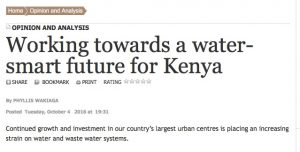Business Daily: Working towards a water-smart future for Kenya
Posted Tuesday, October 4 2016
Continued growth and investment in our country’s largest urban centres is placing an increasing strain on water and wastewater systems.
For example, water supply in Nairobi today is estimated to be 20 percent below total demand. If current trends continue, this deficit is expected to be more than 60 percent by 2035.
This supply-demand gap is driven in large part by population growth, but also by a rapidly growing demand for water for industry, which comprises more than one-fifth national gross domestic product.
In addition, pollution, flooding and wider land use practices in the surrounding catchment further strain the availability of existing clean water supply. Water is a critical input for industry.
In the beverage sector, for every litre of soda produced 2.5 litres of water is needed.
Meanwhile, coffee production requires 200 litres per kilogram of coffee processed. As Kenya aims to develop industry further by creating a competitive manufacturing sector, clean water resources will be needed to help it flourish.
As industrial water use is expected to rise by 125 percent between 2014 and 2030 alone, a collaborative approach is imperative to finding long-term sustainable solutions.
Companies across the world are realising that incorporating sustainable solutions into their business plans is not only socially responsible, but could also have financial benefits.
By addressing environmental and social issues companies can achieve better growth and cost savings; improve their brand and reputation; strengthen stakeholder relations, and boost their bottom lines.
Motivated by the aforementioned realities, local public, private and civil society organizations are joining forces in a new partnership-the Kenya Industrial Water Alliance (KIWA).
Spearheaded by the Kenya Association of Manufacturers and the Water Resources Management Authority, and supported jointly by the International Water Stewardship Programme and the Kenya 2030 Water Resources Group, KIWA provides an action-oriented platform for stakeholders to plan, design and implement activities that will increase water security in Kenya and initially in the Nairobi sub-catchment.
Nairobi’s water management success will be largely based on preserving existing resources. Of over 3,500 “known” boreholes located in Nairobi County less than half have abstraction permits, two-thirds are unmetered, and four in five users do not pay for water. Moving forward, improved regulation and monitoring of ground water abstraction, in addition to proper management of existing data will be essential to effective and sustainable management of the city’s available water resources.
Audits, for example, have shown that Kenyan manufacturers have an opportunity to reduce water use by 20 to 30 percent on average through cost-effective interventions.
We are carrying this out at subsidized rates and we have done ten pilot audits so far in the manufacturing sector.
The writer is CEO of Kenya Association of Manufacturers (KAM) and also chair of the Kenya Industrial Water Alliance (KIWA).

